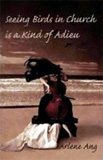Review by Lynn Levin
Cinnamon Press
Meirion House, Glan yr afon, Tanygrisiau,
Blaenau Ffestiniog
Gwynedd, LL41 3SU
Wales
UK
ISBN 978-1-907090-06-6
2010, 80 pp., L7.99 UK, L8.99 outside UK
www.cinnamonpress.com
The poems in Arlene Ang’s new collection Seeing Birds in Church is a Kind of Adieu bid farewell to mothers, fathers, spouses, children, comrades in arms, and others. My own parents are elderly, and I know that I will endure some of the losses that Ang describes in this new collection. I will return to her lyrics at that sad time because of the tenderness they offer, but I savor the poems now for their beauty. These poems of death and remembrance speak intimately of family ties. While a few poems might hint of regret, most reflect on relationships that are solid, tender, and loyal. Though unsentimental, the poems are steeped in love.
In her 2008 collection Bundles of Letters Including A, V, and Epsilon, a collaborative work with poet Valerie Fox, Ang was playful, experimental, and avant-garde. Her 2005 collection The Desecration of Doves delighted with stylish, and sometimes sexy, lyrics. In Seeing Birds in Church is a Kind of Adieu, her fifth collection, Ang returns to the lyrical and richly descriptive style of The Desecration of Doves.
Arlene Ang’s metaphors startle and amaze. A house in August wears “heat like hosiery” (“The Day She Was Called to Identify the Body”). Parents contemplating their adult son’s death, stand outside his bedroom door “like phantom limbs” (“As we think”). In a house of mourning, time passes to no effect: “Like a mother, the clock wipes its face over and over/with its hands” (“A Sun That Isn’t a Source of Heat…”). Ang, who lives near Venice, sometimes brings glimpses of Italy into her poems. In “Col San Martino,” a wife drives to visit the remains of the car wreck that claimed her husband, and the landscape speaks: “From this hillside, the vineyards/sprawl like cemeteries, grape stalks crucified on white pales.”
In the title poem, “Seeing Birds in Church is a Kind of Adieu,” the poet unfolds a painterly tableau in which a sparrow, a pigeon, and a blackbird alight upon a pew, a statue of Christ, and a bronze of a station of the Cross. The poem opens with these lines:
The silence never lasts long.
Wings in the air stroke and turn it upside-down.
Ears were made to capture chaos,
you said. A tree sparrow raps
its beak on the pew as if to remind the wood
that it was once a tree.
The birds seem to symbolize the spirit of a person – a father perhaps? – who had wanted a room overlooking the church.
Ang often memorializes the dead by describing the spaces in which they lived or the rooms in which they are dying. She shows us a sickroom with its crumpled sheets and pills, a studio, a kitchen. In “Leopold’s Room,” a mother seeks to hold on to the memory of her son who died of cancer by having his bedroom videotaped.
The curtains – craggy with nicotine – billow,
smudging a view of the lake.
The tape jams. You don’t slap
the video camera awake, but watch
the wind shut the door on Leopold’s secrets:
the x-rays, the synthetic wigs,
the unworn sweaters
with moth holes mouthing sarcomata.
Amid the tender moments, Ang faithfully observes the things that are not so neat and beautiful. Various poems speak of incontinence or food spoiling in the dying person’s fridge. And yet, one of the things that impress me about these poems is how kind the people in them are to each other, the sensitivity they show, and the dignity they accord those who are suffering the humiliations of illness. In “Surviving Grandfather,” a poem written from a child’s point-of-view, Ang writes:
In the end, his fingers cast spidery
shadows on the wallpaper, white sheets
became stained: this was coffee,
everyone said, and we shouldn’t stare.
The children are then sent outdoors to play, and there they encounter still other clues of the grandfather’s illness.
Ang includes a number of sonnenizios on lines from the poets Ros Barber, Merryn Williams, and Jean Cassou. Invented by the Kim Addonizio, the sonnenizio is a fourteen-line poem that springboards off a line from someone else’s sonnet and which incorporates a word from that first borrowed line in each of the successive thirteen lines. The poem ends with a couplet. I was delighted to discover the sonnenizio, and I see that it is catching on with other poets.
The poems in Seeing Birds in Church is a Kind of Adieu throw their net over a world that is receding, fading, and therefore all the more dear. The poet says to us: “You are facing a loved one’s death, you are visiting his possessions and keepsakes. I’ve been there, too, and this is how it was for me.” These are poems that console. They are clear-minded, unsentimental, stoic even, and yet they radiate love.
Comments are closed.